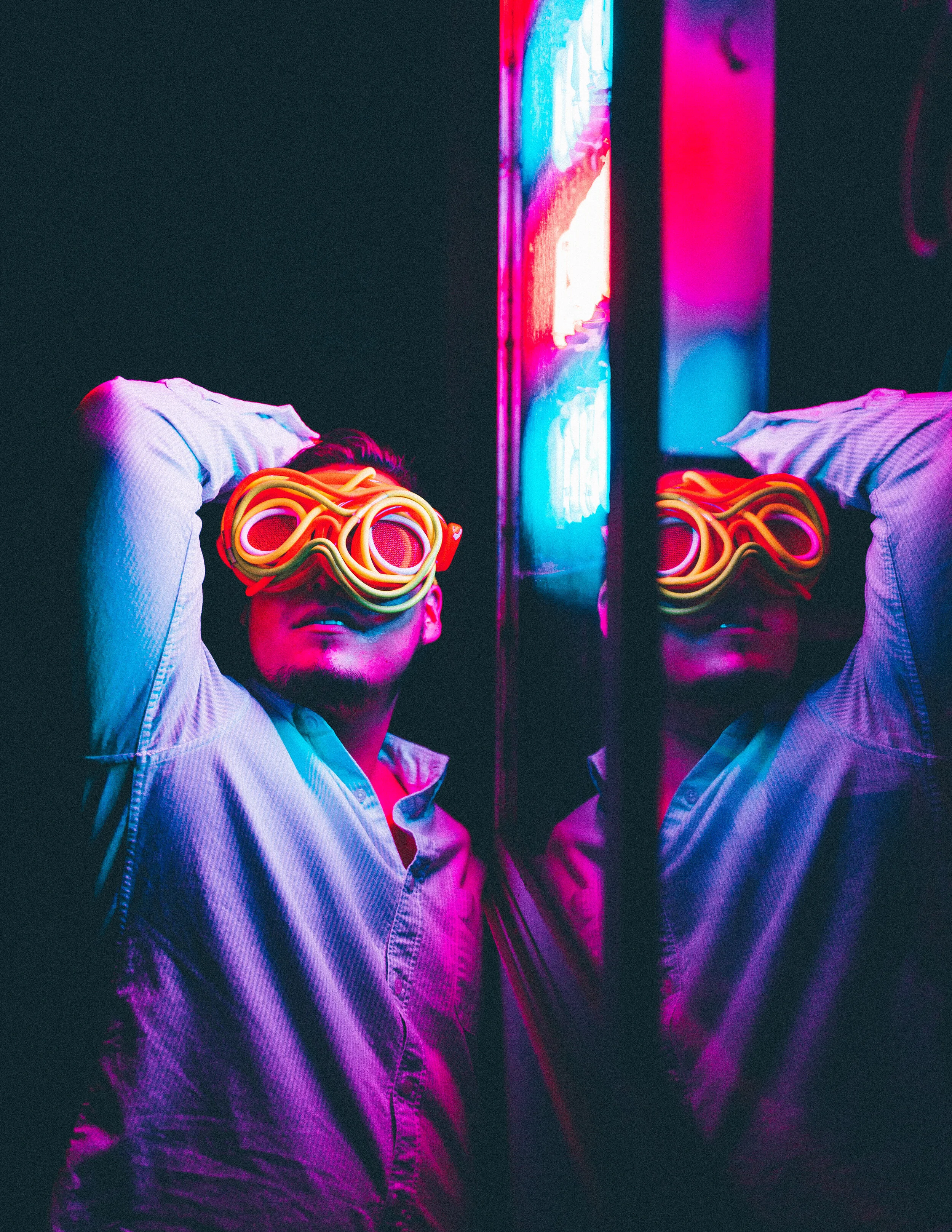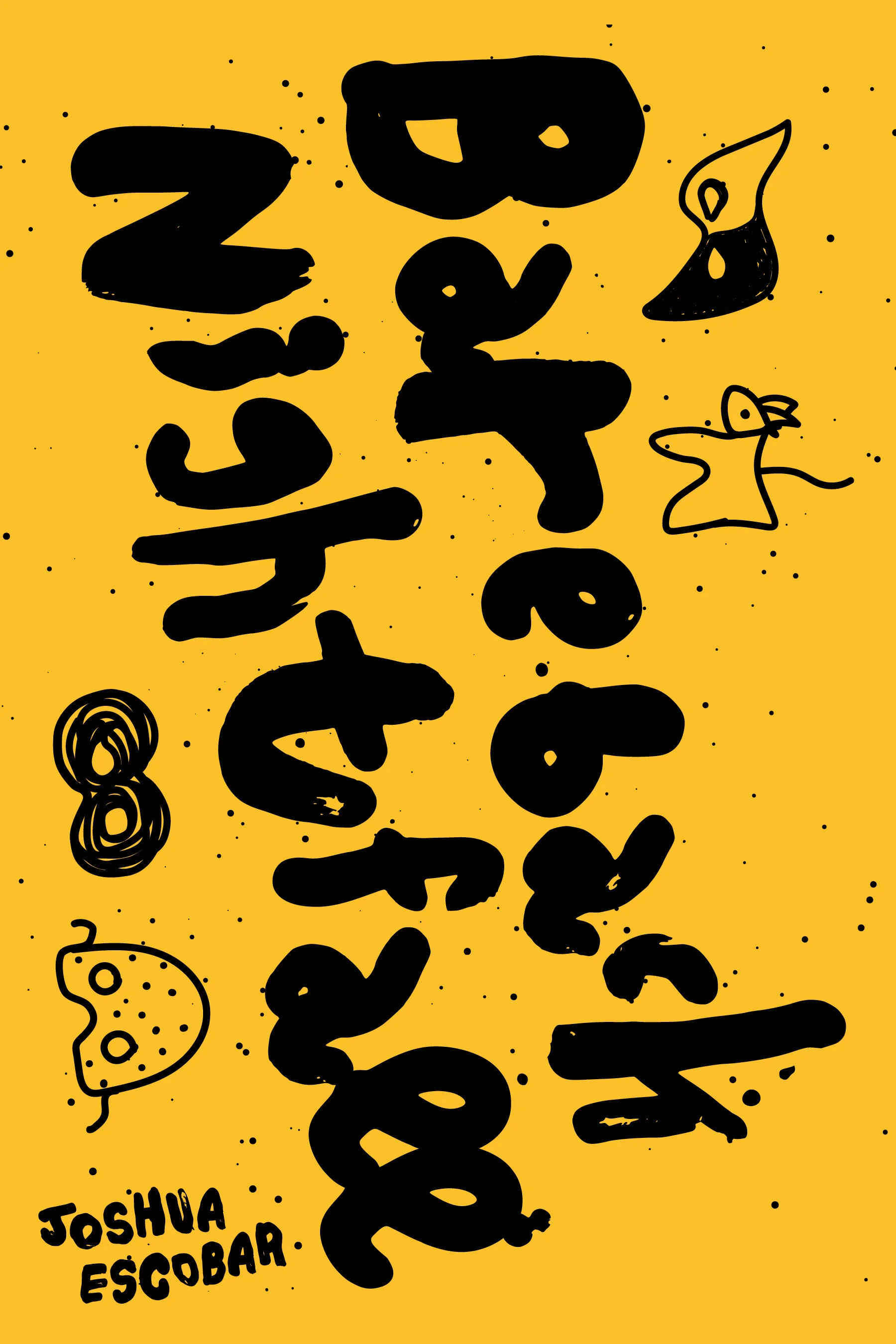BY MONIQUE QUINTANA, IN INTERVIEW WITH JOSHUA ESCOBAR
Newly released from the Noemi Press AKRILICA Series, Joshua Escobar's poetry collection, Bareback Nightfall, is a trip through the intersections of California thought, love, and Queerness. The book reads as an archive and tech scape, like a foray into a palm tree forest that never loses sight of the things that murmur just past desire. Escobar, also known as DJ Ashtrae, is a professor, poet, and zine maker who has an affinity for masquerading brightly, among other things.
Monique Quintana: First off, can you introduce our readers to Lil Piñata?
Joshua Escobar: Lil Piñata is like my imaginary friend. I was so wrapped up in making art when first I came across this piñata while shopping instead of studying. Now Lil piñata is a metaphor for queer love and sexuality whose meaning keeps eluding me, much like a piñata.
MQ: You're innovative when it comes to making your zines. What does making zines mean to you and the way your craft your poems? What advice would you give to aspiring zine makers?
JE: Bernadette Mayer says that soul is not necessarily something we have or own, but a phenomenon we participate in. Making zines has provided a way to collaborate with some poets in the Inland Empire. Experimenting with how we create poetry and assemble publications has brought me a lot of joy, and I've bonded with others. (Uly Mora, my co-editor, became my bestie.) It's thrilling to see different traditions, approaches, and efforts come alive! The passion! My advice to aspiring zine makers is to utilize who and what is around you. The zines we made for Orange Mercury were fashioned from office supplies and cheap craft kits from Michael's. We made them in a real estate office. Some parts were even made with the photocopier at Rite Aid. We weren't so focused on the final product. Making the zine was the fun part.
Cover Image for Bareback Nightfall via Noemi Press
MQ: It seems as if you had a lot of autonomy in your book's aesthetic, Bareback Nightfall. Can you describe the collaborative process and how you relayed your vision to Noemi Press?
JE: Bareback Nightfall is composed of four sections, each representing a different persona (the 4th and final section are about piñatas, for example). Each section has its typeface and poetic forms. This all emerged through the edits. Initially, I submitted my manuscript with just one section, DJ Ashtrae's. Then, at Noemi, it fell into the hands of Suzi F. Garcia, Anthony Cody, and Carmen Giménez Smith. Everyone wanted something different from the manuscript. Suzi sought more vulnerability (more soul), while Carmen appreciated the documentarian subtext, and Anthony asked for more narrative. The manuscript I first submitted was 90 pages single-spaced. So the additional sections, and all their careful edits, helped realize the book inside the manuscript.
MQ: Masking is part of your narrative and aesthetic as a writer. You wear masks that conceal the upper part of your face. Now we wear face coverings to protect our community. As masking becomes more and more politicized in California, how do you see masking as practice inform the work that comes after the book?
JE: My twin brother Joseph Escobar has made me really beautiful masks over the years, and wearing them can be really hard. They really require a certain performance, like learning how to drink water after the world has turned upside-down. I've tried taking selfies, and it's always a trip. The tension of wearing these masks is less like the melodrama of Americans refusing basic hygiene and more like the melodrama of mediated intimacy that one might experience with technology. Seeing someone in a mask can be an intimate experience. If I wore one and walked around, I might become a target. If I wore one and walked around, I imagine that I would come across people who didn't care about my mask, or thought it was pretty, or that I was weird. That acknowledgment might not even fully register in either of us. But there I would be, in my rogue existence, one of us wearing a mask, and the other not.
Joshua Escobar is the author of the chapbooks Caljforkya Voltage and xxox fm, as well as the new, full length collection Bareback Nightfall. He was a 2019 Shandaken: Storm King Fellow, the Dean’s Fellow in Writing at the MFA Program at Bard College, and a Merit Fellow at UC Berkeley’s Graduate School of Journalism. He is a Regional Chair (California) for CantoMundo, and teaches at Santa Barbara City College.
Monique Quintana is a Xicana from Fresno, CA, and the author of the novella Cenote City (Clash Books, 2019). Her short works have been nominated for Best of the Net, Best Microfiction, and the Pushcart Prize. She has also been awarded artist residencies to Yaddo, The Mineral School, and Sundress Academy of the Arts. She has also received fellowships to the Community of Writers, the Open Mouth Poetry Retreat, and she was the inaugural winner of Amplify’s Megaphone Fellowship for a Writer of Color. You can find her @quintanagothic
































